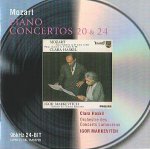Today’s personality-cult pianists could, if they chose, learn a tremendous amount from these performances. Clara Haskil’s 1960 Paris recordings of Mozart’s two minor-key piano concertos, Nos. 20 (D minor) and 24 (C minor), have patrician nobility with no scene-stealing heroics. Both performances, incidentally, have been widely circulated, appearing most recently (along with Haskil’s readings of Mozart’s concertos 13, 23, & 27) in the “Great Pianists of the 20th Century” series. This leaves concertos 9 and 19, and some shrewdly judged Scarlatti sonatas still out in the cold, but somehow I doubt that this reissue will signal any wider rehabilitation of Haskil’s discographic legacy.
The stylistic purity and sobriety of Haskil’s playing is reminiscent of Rudolf Serkin’s–a fact that’s easily explained when you realize that both artists received their early training in Vienna under Richard Robert. After 1905, Haskil became a student of Alfred Cortot in Paris, yet surprisingly little of his influence seems to inform her Mozart performances, except perhaps for a sense of line and fluidity in the slow movements of the works on this disc. The D minor concerto requires neither pathos nor rhetoric to make its point. Haskil brings to it a firmer resolve than you might expect, and the implacable grandeur of her reading (she plays her own fine cadenza in the first movement) is sustained by her iron grip on rhythm and structure. Something of Cortot’s finely cultured liquidity informs her reading of the slow movement, but the electric tension of the finale is often worryingly at variance with the visual image of this performer (small, grey, and over-modest) that still persists.
The C minor concerto also has exemplary cohesion (cadenzas are by Haskil and Nikita Magaloff) and again, a sense of honesty and integrity combined with fine, fastidiously controlled pianism. The variation finale proves fascinating, but other interpreters, in particular Géza Anda and Alfred Brendel, bring greater contrast and temperament to each episode. Recorded sound is acceptable in this new Philips transfer, but the chief drawback throughout is scrappily indifferent orchestral support from the Lamoureux Orchestra (never the world’s most refined band!) under Igor Markevitch. Had this been of a higher order, this reissue would have claimed a higher rating, but piano enthusiasts will still find this an essential purchase.
































